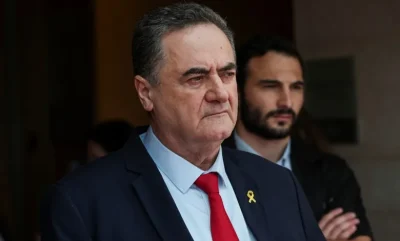Iran’s supreme leader, Khamenei ‘cannot exist anymore’ – Israel threatens after Hospital Attack, 137 Injured

Israel’s Defence Minister, Israel Katz, warned on Thursday that Iran’s Supreme Leader, Ayatollah Ali Khamenei, “cannot continue to exist” following Tehran’s latest missile barrage on Israeli territory. The ministry’s stark declaration signals a sharp escalation in a conflict that has spiraled since the weekend’s opening exchanges.
“A dictator like Khamenei, who heads a country like Iran and has made the destruction of Israel his mission, cannot continue to exist,” Katz told reporters in Jerusalem. He added that the Israel Defence Forces (IDF) “have been instructed” and “know that in order to achieve all of its goals, this man absolutely should not continue to exist.”
The comments come days after U.S. officials revealed that former President Donald Trump vetoed an Israeli plan to assassinate Khamenei. Trump himself later downplayed the plot on social media, writing there were no plans to kill the Iranian leader “at least for now.”
Meanwhile, Israel’s public broadcaster reported that 137 wounded civilians and soldiers had been evacuated to hospitals across southern Israel after Iran launched its most recent wave of missiles and drones. The strikes targeted military installations as well as civilian infrastructure, including power stations and communication hubs.
Overnight, in retaliation, the IDF struck what it characterized as a nuclear research facility inside Iran. Hours later, Iran responded with an attack on Soroka Hospital in Beersheba. Local officials confirmed the hospital sustained significant damage; Iranian state media countered that a nearby military headquarters was the intended target.
Following the hospital strike, Katz posted on X (formerly Twitter): “The Prime Minister and I have instructed the IDF to increase the intensity of attacks against strategic targets in Iran and against government targets in Tehran in order to remove threats to the State of Israel and undermine the ayatollahs’ regime.” His remarks reflect broad consensus among Israeli political leaders, many of whom condemned the hospital attack as an assault on civilians.
As international concern mounts, diplomatic efforts have yet to yield a ceasefire. Both sides show little appetite for de-escalation: Israel vows to press its offensive until what it terms the “regime threats” posed by Iran are neutralized, while Tehran insists its missile strikes will continue until Israel withdraws from strikes on Iranian soil. The standoff leaves the region teetering on the edge of a much wider confrontation.



